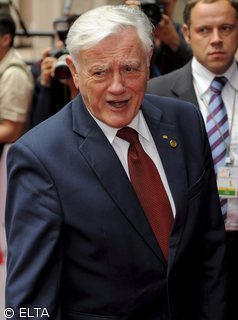Industrial group Siemens AG won't move 2,000 phone assembly jobs from northwest Germany to lower-wage Hungary
Published:
26 June 2004 y., Saturday
Industrial group Siemens AG won't move 2,000 phone assembly jobs from northwest Germany to lower-wage Hungary, now that workers have agreed to lengthen their work week to 40 hours from 35 for no more money, the company said Thursday.
The agreement with the IG Metall union specifies that workers at the Bocholt and Kamp-Lintfort facilities must work an average of 1,760 hours a year measured over a two-year period. Excluding vacation and holidays, that amounts to an average 40-hour week, and permits the company to gear up when there's more work and have people work less when it's slow.
"The solution for Kamp-Lintfort and Bocholt is a triumph of reason," said Siemens CEO Heinrich von Pierer, who has said the facilities must cut costs or see jobs move east. "Our employee representatives, IG Metall and our company management have show that there are realistic ways to counteract job cuts in Germany."
The agreement, struck between the industrial employers' association and IG Metall, takes effect July 1 and guarantees the jobs of the covered workers at the two plants - more than 4,000 in all - who assemble mobile and cordless phones.
Šaltinis:
thestate.com
Copying, publishing, announcing any information from the News.lt portal without written permission of News.lt editorial office is prohibited.
The most popular articles
 Motorola, Inc. today reported sales of $7.5 billion in the third quarter of 2008.
more »
Motorola, Inc. today reported sales of $7.5 billion in the third quarter of 2008.
more »
 The global financial crisis has already battered many European banks. Now it is hitting the EU auto industry, the world’s largest producer of motor vehicles.
more »
The global financial crisis has already battered many European banks. Now it is hitting the EU auto industry, the world’s largest producer of motor vehicles.
more »
 The European Commission has approved, under EC Treaty state aid rules, a German rescue package intended to stabilise financial markets by providing capital and guarantees to eligible financial institutions.
more »
The European Commission has approved, under EC Treaty state aid rules, a German rescue package intended to stabilise financial markets by providing capital and guarantees to eligible financial institutions.
more »
 A new report by the European Commission has assessed the competitiveness of the European Union in the global economy at the end of a decade of rapid economic change.
more »
A new report by the European Commission has assessed the competitiveness of the European Union in the global economy at the end of a decade of rapid economic change.
more »
 Revenue surpasses $15 billion with healthy sales of enterprise software and Xbox 360 consoles.
more »
Revenue surpasses $15 billion with healthy sales of enterprise software and Xbox 360 consoles.
more »
 Airport charges are one of the hidden costs of flying and usually they are passed on from airlines to passengers.
more »
Airport charges are one of the hidden costs of flying and usually they are passed on from airlines to passengers.
more »
 US and European leaders agree to series of summits on world finance.
more »
US and European leaders agree to series of summits on world finance.
more »
 On Monday MEPs will debate a recovery plan for cod stocks in the North Sea and West Scotland. With over 70% of the world’s fish species already fully exploited or depleted, fisheries faces a crisis.
more »
On Monday MEPs will debate a recovery plan for cod stocks in the North Sea and West Scotland. With over 70% of the world’s fish species already fully exploited or depleted, fisheries faces a crisis.
more »
 A new study released by the European Commission today confirms the trend towards more private pension provision in the EU but highlights the need for inclusive coverage and adequate pension levels.
more »
A new study released by the European Commission today confirms the trend towards more private pension provision in the EU but highlights the need for inclusive coverage and adequate pension levels.
more »
 Thursday, October 16, Brussels. President of the Republic of Lithuania Valdas Adamkus attended the second day session of the European Council meeting.
more »
Thursday, October 16, Brussels. President of the Republic of Lithuania Valdas Adamkus attended the second day session of the European Council meeting.
more »